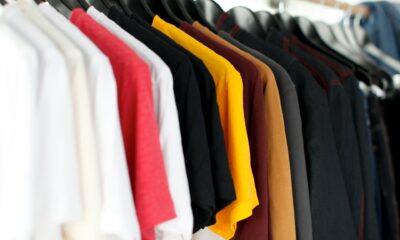Impact Investing
Luxury Giants Unite to Launch European Accelerator for Sustainable Fashion
CHANEL, Kering, Prada, Moncler, and Zegna have launched the European Accelerator under the Fashion Pact to drive sustainability in fashion. Starting in Italy, the initiative aims to decarbonize supply chains, harmonize environmental data reporting, train suppliers, and improve access to financing for cleaner technologies, promoting measurable progress across the luxury sector.

Leading European luxury houses are joining forces to accelerate fashion’s sustainable transition. The Fashion Pact, a global coalition of fashion and textile companies committed to protecting the climate, biodiversity, and oceans, launched in 2019 at the initiative of French President Emmanuel Macron, presents the European Accelerator, a joint initiative involving CHANEL, Ermenegildo Zegna Group, Kering, Moncler Group, and Prada Group.
The goal of the Fashion Pact is to decarbonize the sector’s supply chains and simplify suppliers’ environmental reporting. The project, which is launching in Italy, aims to create shared tools, promote energy efficiency, and facilitate access to the financing needed for low-emission and more resilient fashion.
How the Fashion pact initiative to reduce the impact of fashion works: the 3 phases
The Fashion pact initiative is divided into three interconnected work areas that aim to accelerate the decarbonization of supply chains.
First, the Fashion Pact Accelerator is working to engage the luxury fashion industry in developing a voluntary, non-exhaustive questionnaire for suppliers on relevant environmental data, with the aim of improving the quality and consistency of environmental metrics while reducing the administrative burden of reporting for suppliers.
Subsequently, the Fashion Pact Accelerator intends to strengthen training and capacity development initiatives among suppliers, as well as identify opportunities for improving energy efficiency and adopting renewable energy
Recognizing that financing remains a major barrier to progress , the Accelerator will also work to facilitate supplier access to the investments needed to adopt cleaner technologies and drive lasting transformation.
Phase 1: Harmonizing the collection of environmental data from suppliers
The Fashion Pact Accelerator is currently in its first phase, which, as anticipated, addresses the issue of how to reduce the administrative burden of sustainability reporting for suppliers by proposing an optional and non-exhaustive questionnaire on relevant environmental data.
The Accelerator has begun developing, with the technical support of Quantis, an environmental consultancy firm within the BCG Group, a supplier questionnaire focusing on energy, water, and waste. The questionnaire was tested for six weeks with a diverse group of 74 suppliers in Italy (including manufacturers of finished products, tanneries, textile, yarn, and accessories producers) and with the contribution of the National Chamber of Italian Fashion, which represents over 200 member brands.
By creating a set of questions for the harmonized collection of environmental data, the Fashion Pact Accelerator is committed to promoting clarity, reducing the administrative burden of reporting and enabling concrete environmental progress along fashion supply chains.
Suppliers, in turn, thanks to this new tool, will be able to benefit from a simplified reporting process that eliminates redundancies, improves data reliability, and reduces compilation times.
The questionnaire is available to all fashion brands who wish to test it. By making it available to everyone, the Fashion Pact Accelerator aims to encourage the adoption of harmonized reporting metrics.
The questionnaire, currently being tested and used by pilot suppliers, will be gradually extended throughout the supply chain. It will also be regularly updated by a technical committee to ensure its alignment with the latest regulations and best practices.
Decarbonizing Italian supply chains
According to data from the JUST FASHION TRANSITION 2025 study by The European House Ambrosetti, €4.4 billion will be needed by 2030 for the European fashion sector to achieve its decarbonization goals.
However, in Italy, where many luxury fashion houses concentrate production, economic pressures, such as high levels of debt, make the necessary investment unaffordable for approximately 58% of suppliers Furthermore, the lack of standardized sustainability reporting makes it difficult to obtain accurate data on suppliers’ environmental practices.
__
(Featured image by Hassan Anayi via Unsplash)
DISCLAIMER: This article was written by a third party contributor and does not reflect the opinion of Born2Invest, its management, staff or its associates. Please review our disclaimer for more information.
This article may include forward-looking statements. These forward-looking statements generally are identified by the words “believe,” “project,” “estimate,” “become,” “plan,” “will,” and similar expressions. These forward-looking statements involve known and unknown risks as well as uncertainties, including those discussed in the following cautionary statements and elsewhere in this article and on this site. Although the Company may believe that its expectations are based on reasonable assumptions, the actual results that the Company may achieve may differ materially from any forward-looking statements, which reflect the opinions of the management of the Company only as of the date hereof. Additionally, please make sure to read these important disclosures.
First published in ESG NEWS. A third-party contributor translated and adapted the article from the original. In case of discrepancy, the original will prevail.
Although we made reasonable efforts to provide accurate translations, some parts may be incorrect. Born2Invest assumes no responsibility for errors, omissions or ambiguities in the translations provided on this website. Any person or entity relying on translated content does so at their own risk. Born2Invest is not responsible for losses caused by such reliance on the accuracy or reliability of translated information. If you wish to report an error or inaccuracy in the translation, we encourage you to contact us.

-

 Fintech1 week ago
Fintech1 week agoDruo Doubles Processed Volume and Targets Global Expansion by 2026
-

 Business1 week ago
Business1 week agoTopRanked.io Weekly Affiliate Digest: What’s Hot in Affiliate Marketing [Health Trader Affiliate Program Review]
-

 Business2 weeks ago
Business2 weeks agoTopRanked.io Weekly Affiliate Digest: What’s Hot in Affiliate Marketing [Hosting.com Affiliates]
-

 Africa3 days ago
Africa3 days agoAir Algérie Expands African Partnerships
























